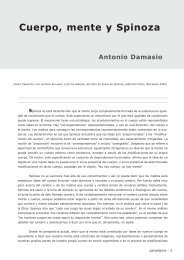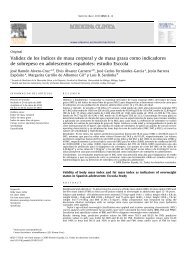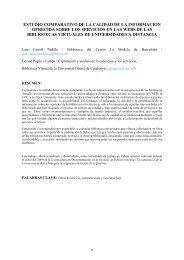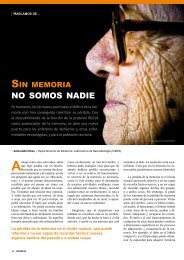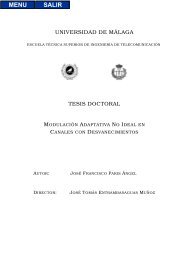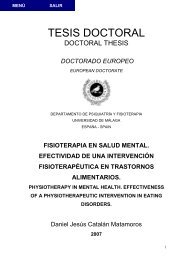Estereotipos negativos hacia la vejez y su relación con variables ...
Estereotipos negativos hacia la vejez y su relación con variables ...
Estereotipos negativos hacia la vejez y su relación con variables ...
You also want an ePaper? Increase the reach of your titles
YUMPU automatically turns print PDFs into web optimized ePapers that Google loves.
Referencias<br />
Hausdorff, J. M., Levy, B. R. y Wei, J. Y. (1999). The power of ageism on physical function of older<br />
persons: Reversibility of age-re<strong>la</strong>ted gait changes. Journal of the American Geriatrics Society,<br />
47(11), 1346-1359.<br />
Havighurst, R. J. (1987). Gerontological Society of America. En G. L. Maddox (ed.), The<br />
Encyclopedia of Aging (pp. 251-252). New York: Springer Publishing Company.<br />
Hays, J., Saunders, W. B., Flint, E. P., Kap<strong>la</strong>n, B. H. y Balzer, D. G. (1999). Social <strong>su</strong>pport and<br />
depression as risk factors for loss of physical function in <strong>la</strong>te life. Aging and Mental Health,<br />
1(3), 209-220.<br />
Heathcote, G. (2000). Autonomy, health and ageing: Transnational perspectives. Health Education<br />
Research, 15(1), 13-24.<br />
Heckhausen, J., Dixon, R. A. y Baltes, P. B.(1989). Gains and losses in development throughout<br />
adulthood as perceived by different adult age groups. Developmental Psychology, 25, 109-<br />
121.<br />
Heckhausen, J. y Krueger, J. (1993). Developmental expectations for the self and most other people:<br />
Age grading in three functions of social comparisos. Developmental Psychology, 29(3), 539-<br />
548.<br />
Heckhausen, J. y Schulz, R. (1995). A life-span theory of <strong>con</strong>trol. Psychological Review, 102, 284-<br />
304.<br />
Heckhausen, J. y Brim, O. G. (1997). Perceived problems for self and others: Self-protection by social<br />
downgrading throughout adulthood. Psychology and Aging, 12(4), 610-619.<br />
Heckhausen, J. (1997). Developmental regu<strong>la</strong>tion across adulthood: primary and se<strong>con</strong>dary <strong>con</strong>trol of<br />
age-re<strong>la</strong>ted challenges. Developmental Psychology, 33, 176-187.<br />
Heidrich, S. M. (1998). Older women´s lives through time. Advances in Nursing Science, 29(3), 65-75.<br />
Henrald, J. C. (1996). Cultural problems of ageing especially regarding gender and intergenerational<br />
equity. Social Science and Medicine, 43(5), 667-680.<br />
Hense, R., Penner, L. y Nelson, D. (1995). Implicit memory for age stereotypes. Social Cognition,<br />
13(4), 399-415.<br />
Hensley, W. E. y Roberts, M. K. (1976). Dimensions of Rosenberg´s scale of self-esteem.<br />
Psychlogical Reports, 38, 583-584.<br />
Hernández, J. M. (2000). Técnicas de investigación y evaluación. En R. Fernández-Ballesteros<br />
(Directora), Gerontología Social (pp. 355-379). Madrid: Pirámide.<br />
Herdman, E. (2001). Challenging the discourses of nursing ageism. International Journal of Nursin<br />
Studies, 39, 105-114.<br />
Herzog, A. et al. (1998). Activities and well-being in older age: Effects of self-<strong>con</strong>cept and<br />
educational attainment. Psychology and Aging, 13(2), 179-185.<br />
Hess, T. M., Auman, C. Colcombe, S. J. y Rahhal, T. (2003). The impact of stereotype threat on age<br />
differences in memory performance. Journal of Gerontology, 56(1), 3-11.<br />
226




